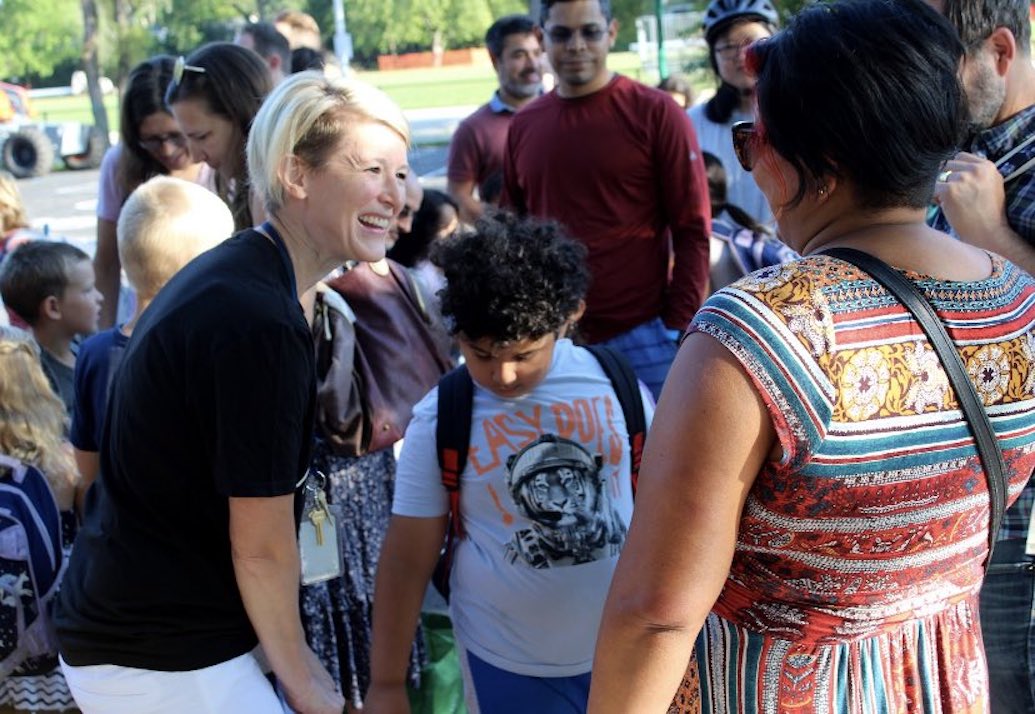
Local schools avoid disruption from teachers shortage but are still in need of support and specialized staff
(Editor’s Note: This story was republished in part at Better.net in alignment with a partnership between the two nonprofits: The Record Community News and Make it Better Media Group.)
Abundant resources offer school districts in New Trier Township advantages when it comes to staffing needs. But even local schools are feeling the squeeze from the well-publicized teachers shortage.
Administrators at the township’s six public school districts (New Trier High School District 203, Wilmette 39, Winnetka 36, Glencoe 35, Avoca 37 and Sunset Ridge 29) all told The Record they are comfortable with teacher staffing to start the school year; however, some said that the hiring for support staff and specialized positions (nurses, social workers, psychologists) is an ongoing problem.
Avoca Superintendent Kaine Osburn said the district has seen a significant drop — upward of 50 percent — of applicants in specializations.
“Last year we had one applicant for a position,” said Osburn, whose two-school district covers parts of Wilmette, Winnetka and Northfield. “That is not sustainable long term.”
The discussion around a teachers shortage is being had nationwide; however, shortages exists on a state to state basis. In Illinois, the state board of education estimates more than 5,000 vacant teaching positions. The group’s data shows that the state’s greatest need is for paraprofessionals, who assist teachers with larger class sizes and workloads as well as work with students that need additional instruction.
Teacher shortages in Illinois, however, have been rapidly increasing since 2017 (2,006 unfilled positions) and skyrocketed during the height of the COVID-19 pandemic. While there was a slight decrease in vacancies from 2020 to 2021, the number of unfilled positions was still more than 4,000.
Data by school is collected annually. Each school is required to report all unfilled positions by Oct. 1 so the data presented above is projected numbers.
As of Aug. 19, 2,129 teaching positions were unfilled in Cook County, according to data from the Chicago Board of Education. While most unfilled positions are within Chicago Public Schools, North Shore schools do have openings.
“We are definitely feeling the staffing shortages,” said Dr. Catherine Wang, superintendent of Glencoe 35, in an email. “I am pleased to share that … our teaching positions are filled. We are, however, still in need of teacher associates and a few support staff positions to be filled.”
Support positions – which include paraprofessionals, as well as custodians, bus drivers, cafeteria employees and receptionists — are also still available in other local districts, including New Trier High School; however, school officials say the number of open positions is typical for this time of year.
This is my 18th year in D29 and I have never seen the applicant pool so small.” Dr. Ed Stange, superintendent of Sunset Ridge District 29
Winnetka 36’s Jeff Knapp, the assistant superintendent of professional learning and human resources, said the pandemic, which led to virtual learning platforms and more regular absences, magnified the need for support staffers, who he said are essential to a district’s success.
“We are seeing more limited numbers of applicants in our associate and substitute positions, which remain critically important,” Knapp wrote to The Record. “We recognized this need … as a truly important part of our educational programming and have made strides to actively recruit those to Winnetka with both financial incentives as well as truly making sure that the experience of these individuals reflected the value and impact they have with our children.”
Sunset Ridge 27, which covers a majority of Northfield, also has openings for support staff, but Superintendent Dr. Ed Stange said filling all positions, including certified teaching slots, has been a burden.
“We are seeing a significant decrease in the number of applicants for vacancies across the board,” Stange said in an email to The Record. “This is my 18th year in D29 and I have never seen the applicant pool so small.”
Local school officials are working to stem the problem. For instance, according to Knapp, teacher retention and recruitment is a priority for Winnetka 36. The district works with local universities and is expanding its outreach to industry career fairs.
Four state senate and house bills going into effect Jan. 1 work to expand opportunities for education students and substitute teachers to obtain certifications and work more days in schools. This will allow more people to become substitute teachers and save hundreds of dollars in teaching certification costs.
Overall, though, New Trier area schools are in an ideal position to attract top-tier candidates, providing salaries and benefits that are among the tops in the state. The minimum starting salary for a teacher in Illinois was $34,576 in 2021-22. That same year, the starting-level teacher’s salary at New Trier High School is between $60,541-$66,595, according to 2020-21 ISBOE data. At Wilmette 39, it is $54,540-$59,471, the data shows.
Osburn said while local districts are affected by the teachers shortage, other less-fortunate districts are in more challenging positions.
“Nothing is really changing on the external landscape and that creates a really challenging and inequitable situation, he said. “As usual, districts that pay more are chasing fewer applicants and districts that have less funding available are losing out.”
The current political climate has not offered help in boosting the field, but a decrease in educational professionals is not new. The shortage has been in the works for years through an ongoing decrease in college students pursuing education degrees.
According to a study from American Association of Colleges for Teacher Education, the number of teaching degrees earned has declined nearly 33 percent since 2009, while the number of bachelors degrees overall have increased 27 percent since 2006.
Osburn believes individual districts in Illinois — of which there are 850, the third most in the country — have limited ability to effect meaningful change at that level and hopes the state can step up by making it “attractive for students to get a teaching degree.”
“Until the entire field has more candidates, in some places it’s going to get much much worse,” he said. “This is an issue about the pipeline coming in to the field.”
The Record is a nonprofit, nonpartisan community newsroom that relies on reader support to fuel its independent local journalism.
Subscribe to The Record to fund responsible news coverage for your community.
Already a subscriber? You can make a tax-deductible donation at any time.

Joe Coughlin
Joe Coughlin is a co-founder and the editor in chief of The Record. He leads investigative reporting and reports on anything else needed. Joe has been recognized for his investigative reporting and sports reporting, feature writing and photojournalism. Follow Joe on Twitter @joec2319


